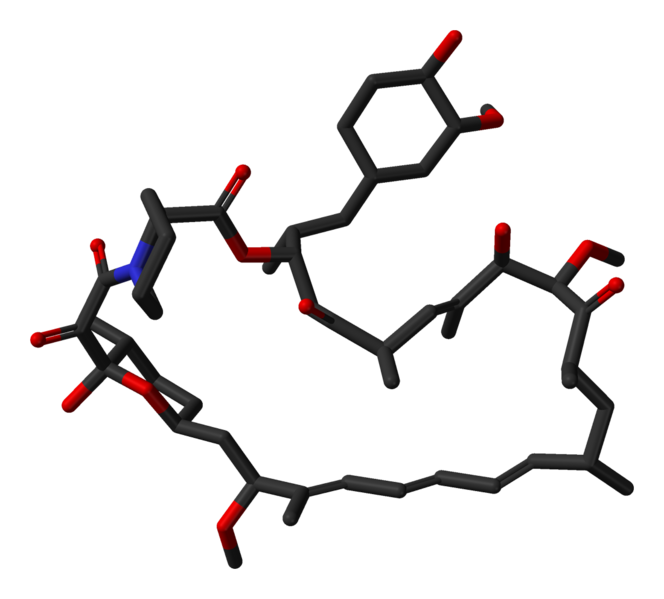

Sirolimus (INN/USAN), also known as rapamycin, is an immunosuppressant drug used to prevent rejection in organ transplantation; it is especially useful in kidneytransplants. It prevents activation of T cells and B cells by inhibiting their response tointerleukin-2 (IL-2).
A macrolide, sirolimus was discovered by Brazilian researchers as a product of the bacterium Streptomyces hygroscopicus in a soil sample from Easter Island[1] — an island also known as Rapa Nui.[2] It was approved by the FDA in September 1999 and is marketed under the trade name Rapamune by Pfizer (formerly by Wyeth).
Sirolimus was originally developed as an antifungal agent. However, this use was abandoned when it was discovered to have potent immunosuppressive and antiproliferative properties. It has since been shown to prolong the life of mice and might also be useful in the treatment of certain cancers.

Vézina C, Kudelski A, Sehgal SN (October 1975). “Rapamycin (AY-22,989), a new antifungal antibiotic”. J. Antibiot. 28 (10): 721\u20136. PMID 1102508.
According to Deepak Adhikari and colleagues, University of Gothenburg, Sweden, a solution to this problem consists of the immunosuppressant drug rapamycin (pictured). The researchers demonstrated that this compound, a lipophilic macrolide inactivating mTORC1, inhibits the exhaustion of the pool of primordial follicles occurring in mice upon phosphatidylinositide 3-kinase hyper-activation. Thus, rapamycin may be used in the clinic to protect female fertility from the detrimental effects of ovotoxic agents such as chemotherapeutic drugs.
The female reproductive lifespan is determined by the pool of primordial follicles, ovarian structures containing immature eggs (oocytes) which periodically mature into cells which can be fertilized. While primordial follicles are gradually and physiologically lost with age, pathological conditions or exposure to environmental chemicals can accelerate their exhaustion leading to infertility.
Pharmacological Inhibition of mTORC1 Prevents Over-Activation of the Primordial Follicle Pool in Response to Elevated PI3K Signaling,
D. Adhikari, S. Risal, K. Liu, Y. Shen,
PLoS ONE 2013, 8(1): e53810.
DOI: 10.1371/journal.pone.0053810
1 comment
Comments are closed.